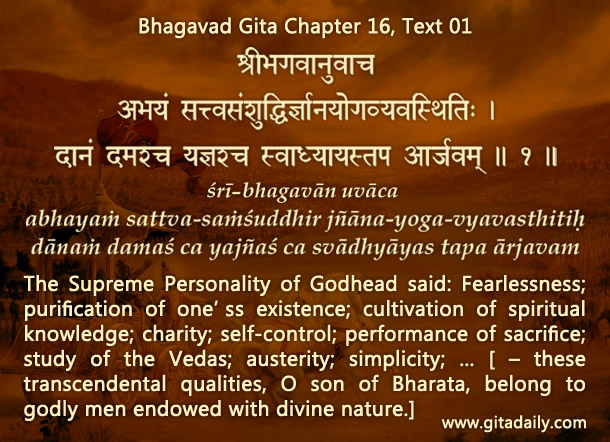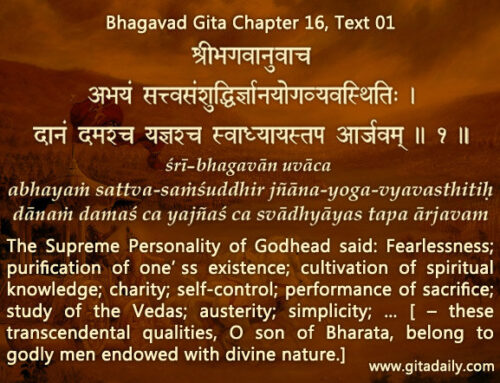In the Bhagavad Gita, there’s only one section where Krishna speaks three successive chapters on his own without any prompting question from Arjuna: the section from chapters fourteen to sixteen. (Chapter fourteen contains a question that is answered within that chapter itself.) Gita Daily
In the fifteenth chapter, Krishna introduces the metaphor of the upside-down tree for representing material existence and describes the process of breaking free from that tree, that is, gaining liberation. Implicitly continuing that tree metaphor in the sixteenth chapter, he describes people at the two extremes of the tree: the godly who live at the end of the tree that is close to reality (16.01-03) and the ungodly who live at the end that is far from reality (16.04-21).
The godly act in ways that take them even closer to reality, till they eventually attain liberation. In contrast, the ungodly act in ways that take them further away from reality and become increasingly entangled. Worse still, by their exploitative actions, they spread disorder, disaster and distress in the world, thus making it hellish. Gita Daily
When Krishna outlines the demonic mentality (16.11-13), it strikingly resembles Duryodhana’s mentality: constant scheming for wealth; eagerness to kill rivals; devilish pride in the success of one’s murderous machinations. Through these descriptions, Krishna indirectly reminds Arjuna of the importance of his divine nature and his kshatriya duty therein, both of which require him to protect the world from such demonic rulers. Given Krishna’s purpose of activating the protector within Arjuna, he describes the horrors of the demonic nature over eighteen verses (16.04-22), after summarizing the divine nature in just three verses (16.01-03).
One-sentence summary:
After describing the tree of material existence in the Gita’s fifteenth chapter, Krishna describes in the sixteenth chapter people at the two extremes of that tree, emphasizing the demonic nature and its consequences to encourage Arjuna to do his duty of protecting the world from demonic rulers. Bhagavad Gita
Think it over:
- How does the Gita’s chapter sixteen continue its chapter fifteen metaphor?
- How does Krishna’s description of the demonic mentality resemble Duryodhana’s mentality?
- Why does Krishna describe the demonic nature more than the divine nature?
***
16.01: Fearlessness; purification of one’s existence; cultivation of spiritual knowledge; charity; self-control; performance of sacrifice; study of the Vedas; austerity; simplicity … – these transcendental qualities belong to godly men endowed with divine nature.
To know more about this verse, please click on the image



JAPA turns demonic nature into Devine nature
… thank You so much – I am amazed by the purport…It opens so many doors – small doors, big doors – which lead to new perspectives. Jaya Srila Prabhupada!
Yes, the Gita is forever opening new doors, even new vistas, of understanding.